Recommended books are either specifically about emotional intelligence or those that we believe make an effective contribution to personal development and leadership effectiveness. Books are listed in author/editor alphabetical sequence rather than in any particular order of preference or recommendation. Because of ongoing website source changes, links are not included. Please do a web search for book/s you are interested in.
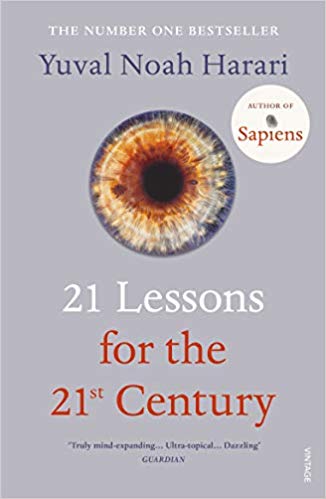 21 Lessons for the 21st Century Yuval Noah Harari | In twenty-one bite-sized lessons, Yuval Noah Harari explores what it means to be human in an age of bewilderment. How can we protect ourselves from nuclear war, ecological cataclysms and technological disruptions? What can we do about the epidemic of fake news or the threat of terrorism? What should we teach our children? Yuval Noah Harari takes us on a thrilling journey through today’s most urgent issues. The golden thread running through his exhilarating new book is the challenge of maintaining our collective and individual focus in the face of constant and disorienting change. Are we still capable of understanding the world we have created? |
 Sapiens. A Brief History of Humankind Yuval Noah Harari | An erudite, insightful and inspiring book that effectively contextualizes significant aspects of social, biological, economic and political influences on humankind. |
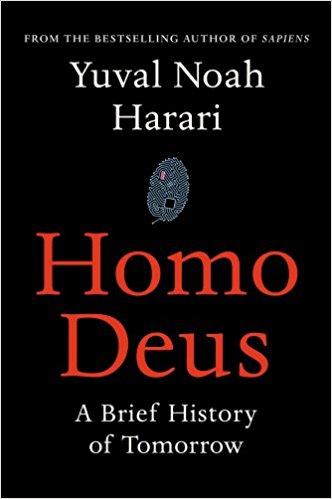 Homo Deus: A Brief History of Tomorrow Yuval Noah Harari | ’Homo Deus’ sets out with enviable (and alarming) lucidity the massive challenges now facing our species as genetic technologies, AI and robotics alter forever our relationships with one another and with other species. It’s even more readable, even more important, than his excellent Sapiens. (Kazuo Ishiguro Guardian Books of the Year) |
 Formula for Success: A core concept of management Lawrence Appley | We like Lawrence Appley’s definition of management (‘Getting things done through other people’) because it says so simply what many other definitions struggle to say. But there is more to Appley than this, and in this seminal book he lays down four basic principles of management that are also recognisably relevant to our beliefs. They are that managers (and leaders) should be:responsive to an orderly approach (stop and think – the ‘red light’ in ‘Mindchange’ )dependent upon unique skills and toolsguided by a code of ethicscontrolled by disciplines It is too easy to think that all that we know about management and leadership has been discovered in the last few years. Appley shows that many of today’s ideas have been around for years and that the challenge is to put them into practice. |
 Leading quietly Joseph Badarraco | This is an uncommon guide to common dilemmas, a practical, realistic model for making tough leadership decisions in today’s fast and fluid environment by Badaracco, a trusted authority on business ethics and leadership. Presenting a new approach to leadership and ethics, this alternative guide is about exercising quiet moral authority. ‘Leading Quietly’ makes the case that creative, practical approaches to everyday situations through everyday ethical choices are the essence of effective leadership. The book provides a toolkit for quiet leaders, laying out a framework for action with eight counterintuitive strategies for making ethical decisions. Each strategy is grounded in an engaging case study, showing leaders resolving (or failing to resolve) difficult problems. Includes surprising answers and counterintuitive approaches to ‘doing the right thing’ that include recognizing your own self-interest, buying time, and bending the rules. |
 The Road to Audacity The Road to AudacityStephen Carter & Jeremy Kourdi | Being audacious and adventurous can be inspiring, but is often submerged by concerns for comfort and security. The authors argue that to be successful in a more uncertain environment individuals and organizations need to adopt a more adventurous and audacious approach. The book uses examples and cases to show how to go about being more audacious and adventurous in our organizations and in ourselves. |
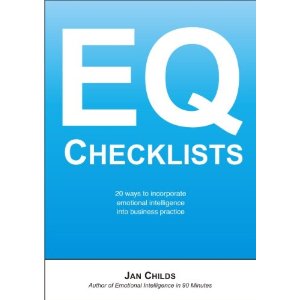 EQ Checklists – ‘20 ways to incorporate emotional intelligence into business practice’. Jan Childs | Much has been written about the theory of emotional intelligence. This practical handbook distils the theory and describes specific applications in a range of different business contexts. The 20 checklists span a broad range of business activity from defining mission, vision and values through performance management, team-building, presentations, coaching, negotiation, meetings, personal development, and much more… Each checklist comes with a full explanation of the principles involved and instruction on how to maximise the benefit of applied emotional intelligence. This book will serve as an essential reference and aide-memoire for anyone wanting to put these powerful principles into practice. The checklists themselves are printed on photocopiable 2-page sections for ease of use. |
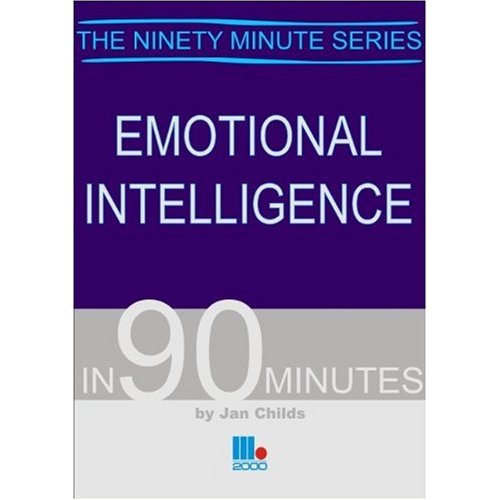 Understanding Emotional Intelligence in 90 Minutes Understanding Emotional Intelligence in 90 MinutesJan Childs | This is another in the “In Ninety Minutes” series which offers the reader a comprehensive but easily readable and digestible text covering a specific topic in an hour and a half of study. The concept of emotional intelligence as a tool for improved personal and business performance is well established amongst psychologists, academics, theorists and consultants. However, in the wider community it still has an air of mystery about it. This concise, practical guide explains both the theory and the practice in straightforward terms which anyone can understand. Areas covered include: What is emotional intelligence?; Why is it important?; a 4-step process for developing emotional competence; how to put it into practice, including: emotional engagement, empathetic listening, assertiveness without aggression, advanced communication, and team management/participation; and, the benefits of EQ – both to individuals and to organisations. |
 MINDCHANGE: the power of emotionally intelligent leadership MINDCHANGE: the power of emotionally intelligent leadershipJan Childs & David Pardey | ‘Mindchange’ is about challenging leaders at every level to develop and maintain a mindset based on continually being open to learn and change, both at a personal and an interpersonal level, within a framework of fundamental principles, values and applied integrity whether within business, politics or the community. The authors challenge leadership practice that puts expediency and short-term ‘quick wins’ before ethics, integrity and the development of valued and long-term business and personal relationships, and advocate not only personal benefits for the people concerned, but also commercial profit and political credibility through emotional competence (applied EQ). This is a powerful book that will set new standards for personal and business conduct, put emotional intelligence at the forefront of decision making, and will persuade leaders to use emotional engagement equally with their intellectual contributions. For case studies, articles and handouts, including leadership case study extracts from ‘ Mindchange‘ : For case studies, articles and handouts, including leadership case study extracts from ‘ Mindchange‘ : ‘Mindchange’ is recommended reading for delegates on EQ4U Ltd’s ‘EQ Executive Leadership’ programme: ‘Mindchange’ is recommended reading for delegates on EQ4U Ltd’s ‘EQ Executive Leadership’ programme: |
 The Other 90%: How to Unlock Your Vast Untapped Potential for Leadership & Life The Other 90%: How to Unlock Your Vast Untapped Potential for Leadership & LifeRobert Cooper | Drawing from the latest research in neuroscience, performance psychology and work physiology, Robert Cooper, PhD shows how to find and use the 90% of our capacity and brainpower that, for many of us, lies dormant. The Other 90% explores what Dr Cooper calls the ‘ Four Keystones’ : Trust, Energy, Farsightedness and Nerve. This book shows how the most exciting breakthroughs will come not from advances in technology, but from a deeper realisation of what it means to be most human and alive. |
 Executive EQ: Emotional Intelligence in Business Robert Cooper & Ayman Sawaf | In recent years there have been a number of research studies and management reports showing connections between various competencies of emotional intelligence and bottom-line business results. These include significant gains in revenue, productivity, innovation, teamwork and profitability. Cost savings, reduced cycle time, greater market share, and increased trust, loyalty and commitment from co-workers, employees, customers and clients are further proven benefits. Many people are beginning to realize that simply being blessed with a high IQ does not guarantee a path to career success. Emotional Intelligence, or EQ, is equally, perhaps even more important. Knowing one’s own emotions and controlling them, recognizing and understanding emotions in others and self-motivation are the key dimensions of EQ. This practical book aims to show you how to develop and apply EQ in your workplace. It includes an EQ map for self-assessment. ‘Executive EQ’ is recommended reading for delegates on EQ4U Ltd’s ‘EQ Executive Leadership’ programme: ‘Executive EQ’ is recommended reading for delegates on EQ4U Ltd’s ‘EQ Executive Leadership’ programme: |
 Beyond Reason: Using Emotions as You Negotiate Beyond Reason: Using Emotions as You NegotiateRoger Fisher & Daniel Shapiro | Although military and economic measures often have been taken in an effort to contain terrorism and violent conflicts, long-term security cannot happen without dealing with the emotional dimension of conflict. The ideas in ‘ Beyond Reason’ , by Roger Fisher and Dr Daniel Shapiro, are the foundation of a new Harvard initiative, ‘ International Negotiation Initiative’ (INI), Harvard Negotiation Project. aimed at reducing global violence. This initiative researches the emotional dimension of terrorism and ethno political conflict and offers practical ideas to improve relations between divided groups ‘ Beyond Reason’ suggests that negotiation is key to human interaction whether at work, home or even in the world of politics and looks at the psychological techniques that can be used to break deadlock and reach a deal that everyone can live with. |
 The Inner Game of Work: Overcoming Mental Obstacles for Maximum Performance The Inner Game of Work: Overcoming Mental Obstacles for Maximum PerformanceTimothy Gallwey | This title provides principles and methods to help us control negative influences such as fear of failure and self-criticism. The principles have been adopted by managers and employees of some of the world’s largest companies, and are a powerful tool for overcoming the inner obstacles to a fulfilling and rewarding career. |
 Frames of Mind Frames of MindHoward Gardner  Intelligences Reframed Intelligences ReframedHoward Gardner | Frames of Mind and Intelligence Reframed by Howard Gardner If you’ re still doubtful that it’ s possible to talk about emotional intelligence, then these two books by Harvard Psychologist Howard Gardner should help to persuade you. Gardner has used the growing understanding of the brain that is the product of modern neuroscience’ s ability to monitor its working to develop his theory of multiple intelligences, including both inter-personal and intra-personal intelligence, both closely allied to the idea of emotional intelligence. Perhaps most importantly, Gardner has started from the perspective of debating the nature of intelligence and the criteria that should be used to judge whether or not a particular faculty can be called intelligence. Most significantly, he shuns the approach that has dominated the IQ debate for years that focuses only on that which can be measured, to argue that the ability to measure a faculty as intelligence is not a condition for defining it as such. Frames of Mind is his original ground-breaking book that develops his theory of multiple intelligence and Intelligence Reframed contains a series of essays that bring his thinking up to date, including an overview of the effect of using the theory to as part of the education of children. |
 blink Malcolm Gladwell | Malcolm Gladwell suggests that our unconscious mind is able to find patterns in situations and behaviour and make quick decisions based on very narrow slices of experience – a process he describes as ‘ thin-slicing’ . And educating our minds to use subliminal clues for fast problem solving can often be more effective than applying a protracted, information loaded and analytical thinking process. A key message in ‘ blink’ of interest to all leaders is that through training and practice, focused and rapid decision making ability can be learnt, including dealing effectively with high stress situations. The ‘ Millennium Challenge – Paul Van Riper’s Big Victory’, a story of intuitive decision making in a war game exercise, will be of particular interest to military leaders. |
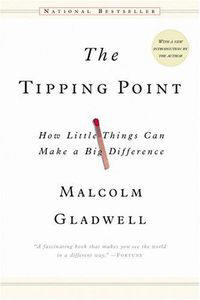 The Tipping Point The Tipping PointMalcolm Gladwell | The idea of ‘The Tipping Point’ is quite simple. It is that many of the problems we face – from crime to teenage delinquency to traffic jams – behave like epidemics. They aren’t linear phenomena in the sense that they steadily and predictably change according to the level of effort brought to bear against them, but are capable of sudden and dramatic changes in direction. Years of well-intentioned intervention may have no impact at all, yet the right intervention – at just the right time – can start a cascade of change. Many of the social ills that face us today, in other words, are as inherently volatile as the epidemics that periodically sweep through the human population: little things can cause them to ‘tip’ at any time and if we want to understand how to confront and solve them we have to understand what those ‘Tipping Points’ are. In this revolutionary new study, Malcolm Gladwell explores the ramifications of this. Not simply for politicians and policy-makers, his method provides a new way of viewing everyday experience and enables us to develop strategies for everything from raising a child to running a company. |
 The New Leaders Daniel Goleman, Richard Boyatzis and Annie McKee The New Leaders Daniel Goleman, Richard Boyatzis and Annie McKee | Goleman, the great populiser of emotional intelligence and Boyatzis, the man who did more than anyone to develop the concept of management competencies, combine with McKee to develop six leadership styles that demonstrate how emotional intelligence affects leadership behaviour. What they emphasise, that effective leadership is all about EQ, provides further evidence for the importance of developing your EQ in order to become effective as a leader. |
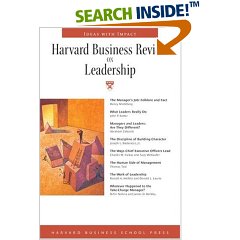 Harvard Business Review on Leadership | What does it take to be a leader in a global economy? In the face of the current worldwide economic slump and recent international upheaval, this question has become increasingly difficult to answer. This collection of classic articles by, amongst others, Henry Mintzberg and John Kotter, is designed to help anyone new to the role of leadership, to reflect on the nature of the role and the skills and behaviours they need. It’ s probably true to say that there is more to challenge your thoughts about leadership in this collection than in many books two or three times the size. |
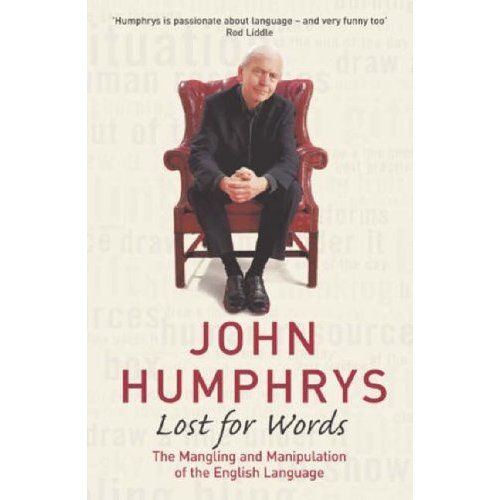 Lost for Words – The Mangling and Manipulation of the English Language John Humphries | An erudite and entertaining personal view of the abuse and misuse of the English language by the well known journalist and broadcaster, John Humphries. Jargon, political guff and business-speak are all commented on, with lucid examples of both deliberate and careless communication that is either unclear or manipulated. While I don’t agree with all his views, it’s a thought provoking read that’s inspired a heightened awareness of the value of clear, simple and honest expression and an ongoing appraisal of my own communication. |
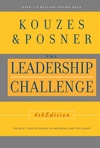 The Leadership Challenge The Leadership ChallengeJames Kouzes and Barry Posner | Further proof, if proof is needed, that effective leadership is based upon a few, really important, behaviours. This best-selling book emphasises the importance of vision and values, of behaving in ways that reflect those values, and of engaging people’ s hearts and not just their minds. Building on the knowledge base of their previous books, the third edition of The Leadership Challenge is grounded in extensive research and based on interviews with all kinds of leaders at all levels in public and private organizations from around the world. In this edition, the authors emphasize that the fundamentals of leadership are the same today as they were in the 1980s, and as they’ve probably been for centuries. This revised edition is designed for leaders in business, government, education, communities and all across society. It focuses on leadership as a critical aspect of human organizations and aims to demonstrate that leadership is everyone’s business. This book features stories and the authors’ personal insights into the fundamental aspects of leadership. |
 Group Dynamics for Teams Group Dynamics for TeamsDaniel Levi | Although academic in places, this is (in our view) by far the best overview of most of the research and writing about how people perform in teams, and why they behave that way. If you are a manager in an organisation that uses teams as the basis for its operations or want to introduce team working into your organisation, then this is an ideal way of getting to grips with the wide range of issues that you need to address. Despite the lack of direct reference to EQ, the clear message of the book is the need to understand how relationships in teams are shaped by the need to be aware of others and their expectations and emotional reactions. |
 The Field Lynne McTaggart | A fascinating and intensely thought provoking book that could change the way you think about human connectivity. First published in 2001, Lynne McTaggart’s ‘The Field’ tells the story of respected frontier scientists all over the globe who have produced extraordinary evidence to show that an energy field – The Zero Point Field – connects everything in the universe, and we ourselves are part of this vast dynamic cobweb of energy exchange. The Field also reveals a radical new biological paradigm – that on our most fundamental level, the human mind and body are not distinct and separate from their environment, but a packet of pulsating energy constantly interacting with this vast energy sea. For associated web-links, go to ‘Websites’ section: http://www.eq4u.co.uk/websites.htm |
 Movement & Making Decisions Carol-Lynne Moore | Along with the right physical working environment, constructive (and enjoyable) working relationships are achieved and sustained by having the right people in the right roles who work effectively as a team. This applies as much to the executive team as it does to the people involved in production or service delivery. The management decision making profiles identified as a result of movement analysis and the three stage framework of management initiative outlined in ‘ Movement and Making Decisions’ provides a practical model with the potential to influence personal and professional development that contributes not only to more effective executive decisions but to better physical and psychological health. The book provides overall, an insightful overview of the theory and practice of movement analysis and its impact on working practices and productivity from the perspectives of both employers and employees. Its particular value is in contributing to a wider understanding of the relationship between psychological and physical health and the potential for achieving not only commercial benefits but a happier, healthier and more productive workforce. |
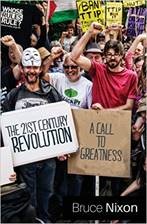 21st Century RevolutionA Call to Greatness Brian Nixon | Today, we face the greatest challenges in human history. There is a widespread collapse of confidence in current politics and economics, and our environment is teetering on the brink of catastrophe. The challenges are enormous, but so are the opportunities to create a society based on the well being of all. This rigorously researched, compact and accessible book makes sense of the situation, offers hope and radical solutions. Above all it empowers you to get involved and shows you how you can actually make a difference. Bruce Nixon’s homepage Blogs that you may find interestingThe 21st Century Revolution – A Call to Greatness >>We need a new Magna Carta to give power to the people >> |
 Making a Difference Making a DifferenceBruce Nixon | This inspiring and practical book deserves to be read widely by leaders at every level, especially those at the top. It is full of wisdom and common sense about how to lead strategic change, so essential in this era of rapid transformation and global competition. It is unusually honest, easy and enjoyable to read, with hardly any jargon and creative in its approach. This ground-breaking, yet friendly and inclusive book is about transformation. In our global, technological age everyone is involved in transformation and innovation, be it in business, other types of organisations, the world community, politics or the family. ‘ Making a Difference’ provides ways of looking at things and tools to help people cope, thrive, and play their unique part, whatever it is, in leading, influencing and easing transformation – in short, how we can make a difference. |
 Team LeadingDavid Pardey(Foreword by John Adair) Team LeadingDavid Pardey(Foreword by John Adair) | How can a team achieve and even surpass its goals? How can team members work well together, be happy in doing so, yet still respect the needs of individuals? These are just a few of the topics tackled by Leading Teams.If you are a team leader – or aspire to that role – Team Leading fills in many of the details about the nature of teams and team leadership and the range of skills and knowledge you need to be able to be effective in the role. Written specifically to meet the requirements of the ILM Certificate in Team Leading, the book also meets the needs of anyone wanting to develop their all round performance in this demanding role. |
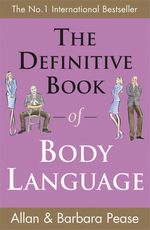 The Definitive Book of Body LanguageAllan & Barbara Pease The Definitive Book of Body LanguageAllan & Barbara Pease | The ‘Definitive Book of Body Language’ is a comprehensive guide to the observation and understanding of human posture and gestures. The conscious and sub-conscious non verbal information we display can be powerful indicators of innermost thoughts and feelings. And an acute observer develops a heightened awareness when there is a mismatch between body language and what is actually said. The book includes suggested body language guidelines for a range of scenarios including how to build rapport. A useful supplementary read to Paul Ekman’s more EQ focused ‘Emotions Revealed’. |
 The Effective Director: The Essential Guide to Director and Board Development The Effective Director: The Essential Guide to Director and Board Development Edited by Chris Pierce | Although most directors are experienced, well-qualified managers, many find that when they are appointed to the board there is little guidance available to them about their new role. This volume offers advice on what a board of directors is supposed to do. Using extensive real-life case studies from industry, business and the not-for-profit sectors, the writers show how to develop the director role and improve the working methods of the board as a whole. Quizzes, tick boxes and bullet points appear throughout the text. ‘The Effective Director’ is recommended reading for delegates on EQ4U Ltd’s ‘EQ Executive Leadership’ programme: Overview |
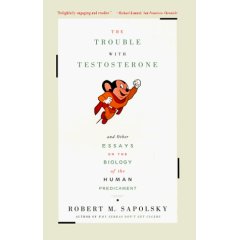 The Trouble with Testosterone Robert Sapolsky | Professor of biology and neuroscience at Stanford University and author of ‘Why zebra don’t get ulcers’, Robert Sapolsky’s, ‘The Trouble with Testosterone‘ is a witty, authoritative and engaging collection of essays about the human condition. Chapter titles such as ‘How big is yours?’ and ‘the night you ruined your pyjamas’ (about recognising kinship in neurochemistry) and (about biology and society) respectively, analyse the links between biology and human behaviour in an entertaining and informative way. |
 The Fifth Discipline -The Art & Practice of the Learning Organisation The Fifth Discipline -The Art & Practice of the Learning OrganisationPeter Senge | Occasionally there is a book that has such an impact that thinking on management and leadership is changed significantly. The Fifth Discipline will possibly be seen, in years to come as just such a book. Senge argues that there are five disciplines (Personal mastery, mental models, building shared vision, team learning and the fifth – systems thinking) that combine to enable organisations to learn and develop. The issues he addresses are very similar to those of need to be self-aware and aware of others, to be able to communicate with others and be reflective to make things happen. The Fifth Discipline is about why organisations need people with these abilities, whereas ‘Mindchange’ (the Jan Childs & David Pardey book listed above) is about what you can do to develop the skills needed to practice many of Senge’ s disciplines. |
 Making Time – Why Time Seems to Pass at Different Speeds and How to Control it Making Time – Why Time Seems to Pass at Different Speeds and How to Control itSteve Taylor | The message of this engaging book is the exploration of how we can take charge of altering our sense of time and make the most of the time that we have. Steve Taylor asserts that it’s not sufficient to simply perceive time as a linear measure in terms of hours, months or years – and that this judgment of time can be misleading in any case. What is more important is measuring a person’s experience of time and their subjective perception of time passing, which in turn depends on how life is lived and the state of consciousness involved. |

